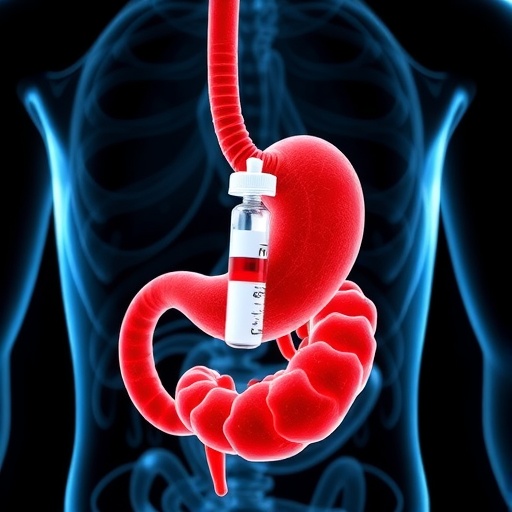In a groundbreaking advance that could revolutionize treatment options for type 1 diabetes, scientists have successfully demonstrated the in vivo conversion of human stomach cells into insulin-producing pancreatic beta-like cells through transplantation of genetically engineered stomach organoids. This innovative study, recently published in Stem Cell Reports, provides a promising new avenue for restoring insulin production in diabetic patients by reprogramming a patient’s own stomach cells to secrete insulin, thereby potentially circumventing the limitations of current insulin replacement therapies.
Type 1 diabetes arises primarily due to the autoimmune destruction of beta cells in the pancreas, leaving patients dependent on exogenous insulin administration to regulate blood glucose levels. Despite advances in insulin delivery technology, such as pumps and continuous glucose monitoring, the inability to restore endogenous insulin secretion remains a fundamental therapeutic challenge, contributing to lifelong disease burden and risk of complications. The research team, led by Xiaofeng Huang at Weill Cornell Medicine and Qing Xia at Peking University, sought to harness cellular plasticity within the human gastrointestinal tract to regenerate functional insulin-secreting cells in vivo.
The conceptual backbone of their approach lies in generating human gastric organoids — three-dimensional, multicellular structures derived from stem cells that mimic aspects of stomach tissue architecture and function. These organoids were genetically engineered to carry a “genetic switch” capable of initiating the reprogramming of gastric epithelial cells into insulin-producing cells reminiscent of pancreatic beta cells. This involved introducing key transcription factors known to govern pancreatic beta cell identity and insulin gene expression, thereby redirecting cell fate within the organoid model.
After introducing the modified stomach organoids into the abdominal cavity of immunocompromised mice, the grafts were monitored for survival, maturation, and integration with host tissues. Strikingly, the organoids persisted and vascularized over a six-month period, indicating stable engraftment and interaction with the surrounding microenvironment. Activation of the genetic switch triggered a robust conversion of gastric cells to insulin-positive cells, exhibiting molecular signatures and ultrastructural hallmarks characteristic of pancreatic beta cells.
Detailed transcriptomic and proteomic analyses confirmed that the converted cells adopted gene expression patterns aligned with bona fide pancreatic beta cells, including upregulation of insulin, PDX1, NKX6.1, and other critical beta cell markers. The presence of proper insulin granules within these cells suggested functional competency in hormone synthesis and storage. Importantly, when transplanted into diabetic mouse models, the reprogrammed human cells were capable of secreting insulin in response to blood glucose levels, effectually reducing hyperglycemia and improving glycemic control.
This study marks a significant milestone given that previous cellular reprogramming efforts mainly utilized mouse models or in vitro culture systems without demonstrating durable functional insulin secretion in living organisms. By leveraging human tissue-derived organoids and demonstrating in vivo differentiation and function, the researchers bring closer the vision of autologous cell-based therapies for diabetes that can overcome immune rejection and supply limitations faced by donor pancreatic islets.
Despite these encouraging findings, the authors stress the need for extensive preclinical safety evaluation, including assessment of off-target effects, long-term engraftment stability, and potential tumorigenicity. Furthermore, translating this strategy from mice to humans requires overcoming challenges related to delivery and precise control of the genetic switch activation within the human stomach, as well as ensuring that newly generated beta-like cells can effectively respond to physiological glucose fluctuations.
The implications of this research are profound, suggesting that the stomach, a readily accessible and regenerative organ, may be repurposed as an endogenous “factory” for producing insulin locally within the body. This paradigm shift could reduce the reliance on external insulin administration and pave the way for personalized regenerative medicine strategies that utilize a patient’s own cells, thereby enhancing treatment efficacy and minimizing immune complications.
Mechanistically, the study builds upon the understanding of developmental biology and transcriptional networks governing pancreatic lineage specification. By recapitulating those signals within adult stomach tissue, the scientists provide compelling evidence of the plasticity and latent potential of differentiated cells to undergo lineage transdifferentiation when exposed to key developmental cues, highlighting a new frontier in regenerative biology.
The transplantation of stomach organoids represents an elegant model system to study cellular reprogramming in vivo, integrating tissue engineering, gene editing, and stem cell biology. This multidimensional approach enables precise manipulation of cell fate while maintaining a physiological milieu that supports maturation, vascularization, and functional integration, which are critical for the success of any regenerative therapy.
Future research directions will likely involve refining the genetic editing strategies to enhance efficiency and specificity, developing minimally invasive techniques to deliver and activate organoids in situ, and conducting GLP-compliant toxicology studies that will lay the foundation for clinical trials. Assessing the durability and functional responsiveness of the converted beta-like cells over extended timeframes will also be pivotal in determining therapeutic viability.
In conclusion, this pioneering research elucidates a novel strategy for directly converting human stomach cells into insulin-secreting cells, providing a transformative potential therapeutic approach for type 1 diabetes. While hurdles remain before clinical application, the findings illuminate a path toward in vivo regenerative therapy that could one day enable patients to regain endogenous insulin production, drastically improving quality of life and disease management.
Subject of Research: In vivo induction of insulin-secreting pancreatic beta-like cells from human stomach organoids through genetic reprogramming.
Article Title: Modeling in vivo induction of gastric insulin-secreting cells using transplanted human stomach organoids
News Publication Date: 6-Nov-2025
Web References:
Stem Cell Reports journal: https://www.cell.com/stem-cell-reports/home
Original article: https://www.cell.com/stem-cell-reports/fulltext/S2213-6711(25)00312-1
Institutions: Weill Cornell Medicine (https://weill.cornell.edu/), Peking University (https://english.pku.edu.cn/)
Image Credits: Hyunkee Kim
Keywords: type 1 diabetes, insulin-secreting cells, pancreatic beta cells, stomach organoids, cellular reprogramming, gene editing, regenerative medicine, in vivo transdifferentiation, stem cell therapy
Tags: cellular plasticity in diabetesdiabetes treatment advancementsendogenous insulin productiongenetically engineered organoidshuman stomach cellsinsulin-producing cellspancreatic beta-like cellsregenerative medicine for diabetesreprogramming stomach cellsstem cell technology in diabetestype 1 diabetes therapyWeill Cornell Medicine research





